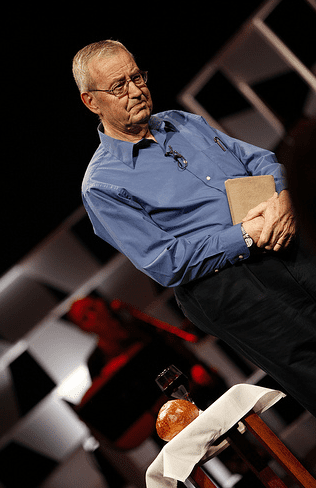If you are a Christian, and by that I mean if you “believe” in King Jesus and you follow him, apologetics will be unavoidable at two levels. The first level is in your own head as you seek to make sense of your Christian faith, and this “in your head” level of apologetics is a life-long process.
The second level is “in the cafe” where someone asks you about what you believe and you realize you are being asked in the ordinary plane of life why you believe what you believe. This is your public confession, and when I say there is often conflict between the “in your head” and “in the cafe” levels I mean many are not willing to trot out the doubts in their head when they are “in the cafe.” One could say “in the head” apologetics is less confident than “in the cafe” apologetics.
So most folks seek what might be called “cushions of confidence,” places in their faith where they find soft, comfortable places and where they can feel confident about their faith. Some folks seem to be totally confident about everything in the faith and I don’t think it would be anything but truthful to say this about someone like Norm Geisler. But for many there are places in the faith where they are not so confident — say atonement theories, views of Scripture that conflict with their instincts when they read the Bible, apocalyptic worldviews, homosexuality — and others (cushions of confidence) where they are confident — Jesus himself, his kingdom vision, loving God and others, redemption in Christ, the afterlife.
Do you see in yourself or others this “cushions of confidence” approach? Do you see the more comprehensive approach? Is apologetics unavoidable?
Those who are altogether confident and those who find only cushions of confidence, if they think about, are both doing apologetics.
This is why I was encouraged to see that Khaldoun Sweis and Chad Meister have edited an anthology of primary sources in apologetics, called Christian Apologetics. I was drawn to Jim Beilby’s essay first, one in which he examines varieties of apologetics. He sorts through in readable prose the three sorts of apologetics:
1. Evidentialist: Bill Craig
2. Presuppositionalist: Van Til
3. Experientiaist: he gives examples of those who use experientialist arguments, including Swinburne, Alston, and C.S. Lewis.
Leading me to the question: Which of these approaches has been most helpful to you?
There’s so much in this book: a long section on the existence of God and the various arguments, the Trinity, the Incarnation, the Bible, Miracles, Resurrection of Jesus, Body/Soul and the argument from Mind, the Problem of Evil, Christianity and Science and Christianity and the World.
Frankly, this is the kind of book that many postmodern students in colleges would absolutely love to use as a full semester, if not full year, course on Christianity. These are many of the questions they are asking, though I’d like to see some of the sticky questions about Old Testament (God, war, election, historical reliability) addressed. The book is shaped toward the apologetics concerns of evangelicals students (a book from Zondervan tends to do that!).










